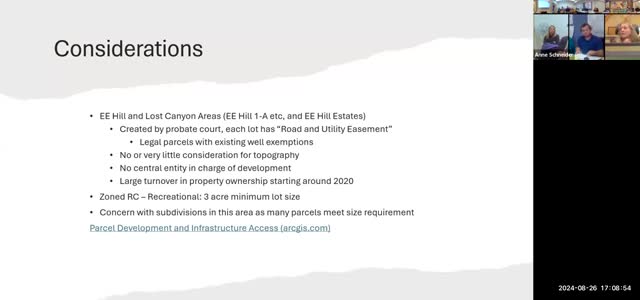Water Management Strategies Spark Controversy in Local Planning
August 26, 2024 | Lake County, Colorado
This article was created by AI summarizing key points discussed. AI makes mistakes, so for full details and context, please refer to the video of the full meeting. Please report any errors so we can fix them. Report an error »

In a recent government meeting, officials discussed critical water management strategies and zoning regulations as part of ongoing efforts to revise the comprehensive plan. The dialogue highlighted the need for a balanced approach to water allocation, particularly in light of potential drought conditions and the implications for local development.
Participants emphasized the importance of establishing a clear starting point for water resources, with discussions centering on the allocation of 10 to 13 acre-feet of water. There was a consensus that this initial allocation should be carefully monitored and potentially limited to ensure sustainability. The conversation also touched on the necessity of reevaluating zoning codes, particularly in areas like E.E. Hill, where current regulations may not align with community needs or environmental considerations.
A significant point raised was the potential for expanding water storage capabilities, specifically through the Hayden Pond project, which could increase available water by approximately 30 acre-feet. This expansion is seen as crucial for managing variable water supplies and ensuring that the community can meet its demands, especially during dry years.
The meeting also addressed the financial aspects of water management, with officials noting the substantial investments made over the past 25 years—amounting to around $1 million. There was a call for the establishment of an enterprise model that would allow for more flexible water storage and leasing options, thereby generating revenue to support infrastructure improvements.
As the comprehensive plan revision progresses, officials are considering innovative approaches to water allocation, including prioritizing shares for specific community needs, such as affordable housing initiatives. The discussions reflect a proactive stance on addressing both immediate water management challenges and long-term community development goals.
Participants emphasized the importance of establishing a clear starting point for water resources, with discussions centering on the allocation of 10 to 13 acre-feet of water. There was a consensus that this initial allocation should be carefully monitored and potentially limited to ensure sustainability. The conversation also touched on the necessity of reevaluating zoning codes, particularly in areas like E.E. Hill, where current regulations may not align with community needs or environmental considerations.
A significant point raised was the potential for expanding water storage capabilities, specifically through the Hayden Pond project, which could increase available water by approximately 30 acre-feet. This expansion is seen as crucial for managing variable water supplies and ensuring that the community can meet its demands, especially during dry years.
The meeting also addressed the financial aspects of water management, with officials noting the substantial investments made over the past 25 years—amounting to around $1 million. There was a call for the establishment of an enterprise model that would allow for more flexible water storage and leasing options, thereby generating revenue to support infrastructure improvements.
As the comprehensive plan revision progresses, officials are considering innovative approaches to water allocation, including prioritizing shares for specific community needs, such as affordable housing initiatives. The discussions reflect a proactive stance on addressing both immediate water management challenges and long-term community development goals.
View the Full Meeting & All Its Details
This article offers just a summary. Unlock complete video, transcripts, and insights as a Founder Member.
✓
Watch full, unedited meeting videos
✓
Search every word spoken in unlimited transcripts
✓
AI summaries & real-time alerts (all government levels)
✓
Permanent access to expanding government content
30-day money-back guarantee

